Edith Maxwell's Blog, page 104
February 10, 2021
Wicked Wednesday: Be careful what you wish for…
We’ve all had the experience. Something we wished for, fervently or casually, comes true. And it turns out to be not something we wanted at all. Wickeds, tell us about a wish you later regretted.
I’m giving away an Advance Reader Copy of Shucked Apart to a commenter below who answers the same question.
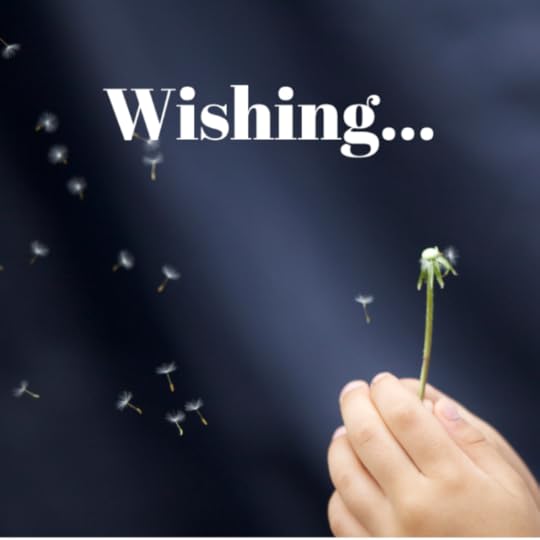
Sherry: I always think perhaps I brought Covid 19 on us single-handedly by wishing for a period of time when I could stay home and grow out the gray in my hair. Here I am eleven months since I’ve had my hair colored and there is still some color in it. Yeesh! The surprising thing is that I still have a lot of dark hair particularly in the back. I’ll be relieved when this growing out business is all over with! And when we can travel again.
Edith/Maddie: I know what you mean, Sherry! Not about the gray, for me, but wishing I didn’t have to think about the trials of traveling and packing (and suitable professional clothes for conferences). I’d give anything right now to be loading up a suitcase and printing out a boarding pass, especially if it took me directly to family. What’s the quote about living in interesting times?
Jessie: When my kids were small I sometimes wished it were more possible to just hear myself think. Now that they are mostly grown I end up hearing a lot more of my own thoughts than I ever intended!
Liz: I remember really pondering this saying as a kid and trying to reconcile what it meant. Of course as an adult it became way more obvious. There have been many things I’ve said this about, from relationships to homes I’ve bought that have been terrible choices. A couple of times it’s happened at work where I would wish a bad boss away only to have them be replaced by someone worse!
Barb: So many are pandemic-related. I used to wish all the time, “I wish the world would slow down. I wish I didn’t have to travel this month. I wish I didn’t have so many things on my calendar.” HA! I am completely done with wishing for any of that.
Julie: Barb, I remember last April, with every weekend booked with author events of one sort or another, wishing I didn’t have as much going on. Like everyone else, I take those words back. I’ve had experiences I’ve wished for that didn’t live up to expectations, but I’m not sure I’d take them back.
Readers: Do you have “be careful” what you wish for example that you’d like to share? One lucky commenter will receive an Advance Reader Copy of Shucked Apart.
February 9, 2021
Guest Liz Milliron #Giveaway
Edith here, welcoming Liz Milliron back to the blog.
I love her historical Homefront Mystery series and am delighted I have The Stories We Tell to curl up on the couch with – it dropped on my Kindle today! One lucky commenter will win a copy, too!
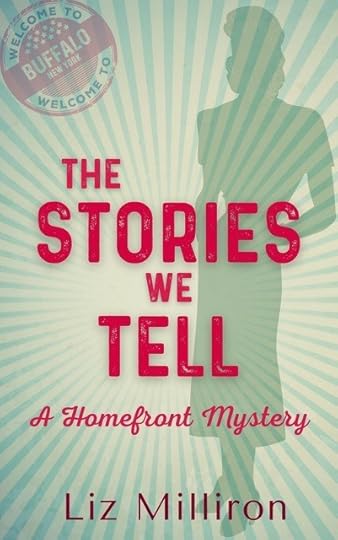
Here’s the blurb:
It’s December 1942 and Betty Ahern is enjoying her fledgling career as a private detective, investigating everything from missing jewelry to wandering boyfriends. But when Bell Airplane co-worker Emilia Brewka, whose grandmother recently died, wants Betty to prove the death was murder and not natural causes, Betty thinks Emilia’s grief has her seeing things that aren’t there.
After a member of the visiting Polish government in exile is murdered, she learns the grandmother may have contacted him about a secret involving a wealthy Buffalo family–a secret that goes all the way back to the Old Country and the aftermath of the Franco-Prussian war. Suddenly, murder looks more than possible.
Betty and her friends travel between Buffalo’s working-class neighborhoods and the city’s high society, determined to unearth the secret and find justice for Emmie’s grandmother. But mixing with the upper class quickly becomes dangerous and potentially deadly—both for Betty’s career as a detective and herself.
Thanks, Edith, for having me back on Wickeds.
The Stories We Tell is my fifth book (five books, how did that happen?). Since it’s kind of a milestone number, it’s got me a little reflective as I gaze at a field of freshly fallen snow.
What a long, strange year it’s been, hasn’t it? Puts me in mind of the Chinese curse: May you live in interesting times. I’d like the times to go back to being boring, thanks.
It also makes me wonder how my grandparents would have dealt with all of this, the pandemic and all the political upheaval. I’m specifically talking about my paternal grandparents (my mother’s mother was much more vocal – I know exactly what her opinions would have been).
 Betty and Clarence at their wedding
Betty and Clarence at their weddingMy grandparents were, without a doubt, the product of their generation. Betty and Clarence Lederman grew up in the Depression. Grandma couldn’t bear even the sight of Karo corn syrup, having eaten it so frequently as a child. Papa had a knack for hiding cash (the stashes my dad found upon emptying his childhood home after his parents died were not trivial). He was also one of those people who was impossible to buy for. At one point, he owned four VCRs. When we asked why, he said, “Because I want them.” He’d gone without for so long that once he had money, as soon as he wanted something he bought it.
They were both no-nonsense people. They had no patience with self-pity. Even as kids, my siblings and I got maybe a day – and usually less – to wallow in misery when something happened. After that, my grandparents’ question was, “What are you going to do about it?”
Papa served with the 1st Armored Division in World War II. He had trench foot twice and was told if it happened a third time, he’d be sent home. Grandma worked at Bell Airplane; my dad says she worked mostly on riveting the plane fuselages. She waited while Papa was overseas.
After the war, Papa worked at Bethlehem Steel for 30 years while Grandma raised two boys and worked in a high school cafeteria. In short, they didn’t have time to feel bad for themselves.
Thinking of them, I wish I could hear what they had to say about current events. The pandemic? Wear the mask, get a vaccine, and do your part (sounds familiar to me – during WWII, it was all about doing what you had to do and doing your part). The events of January 6? I think they would have been appalled, even as they had sympathy for the frustrations of people who believe they’ve been left behind. I’m quite sure they’d have had zero patience with politicians and their games, voting to contest the election and holding up the process. I can hear Papa now, “You lost. Stop being a baby and get on with it. Do your job.”
It’s an attitude I’ve tried to bring to Betty Ahern, my protagonist in The Homefront Mysteries. Got a problem? Say a prayer, buckle down, and get to work. I hear Betty (who sounds suspiciously like Grandma) in my ear frequently. “Complaining won’t solve anything. Do your part.” Times are tough. They’ve been tough throughout history.
Grandma and Papa would’ve also reminded me that everything we’re going through now has happened before and we’re still here to talk about it. The world survived the Black Death and the Spanish flu pandemic. We’ve survived two world wars. Everything bad will end.
My grandparents knew it. Betty knows it. And deep down, I know it.
But I’m sure they’ll forgive me if I hope it ends sooner rather than later.
Readers: What’s something your family taught you that you find particularly applicable to current events? One lucky commenter will win a signed copy of The Stories We Tell (U.S. residents only).

Liz Milliron is the author of The Laurel Highlands Mysteries series, set in the scenic Laurel Highlands of Southwestern Pennsylvania, and The Homefront Mysteries, set in Buffalo, NY during the early years of World War II. She is a member of Sisters in Crime, Pennwriters, and International Thriller Writers. A recent empty-nester, Liz lives outside Pittsburgh with her husband and a retired-racer greyhound. http://lizmilliron.com
February 8, 2021
Cute Baby Sells Shucked Apart
by Barb, in Key West

Some of you may remember my previous campaigns, starting with Cute Babies Sell Clammed Up. In 2013, I had a new series, the Maine Clambake Mysteries, and a new granddaughter, a first grandchild, in fact. My son, Rob, sent me a photo of him reading Clammed Up to his daughter and the game was on!
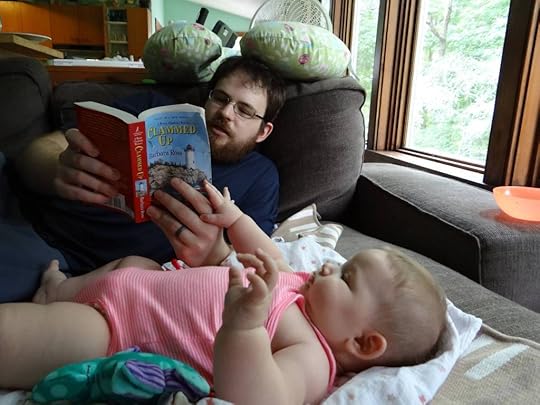
My brother, Rip, got in on the act with his first grandchild, also a baby girl.

As did my cousin, Rob, with his second grandchild, first granddaughter. It’s hard to believe these kids are going to be eight this year!

In 2019, I had a new series–and a new granddaughter. Thus a new model emerged for Cute Baby sells Jane Darrowfield.

Now there’s a new baby on the scene. She was born a year ago, right after the eighth Maine Clambake Mystery, Steamed Open, was released, so she’s a little older than our previous spokesmodels. A true pandemic baby, she’s never stayed with a babysitter while her parents had a night out on the town. On the other hand, she’s extremely proficient at waving bye-bye on a FaceTime call. (Sometimes when you’re done with the call and sometimes when she decides she’s done with you.) A proficient walker, she has a little more control over her environment than previous models, so it took two photo sessions to get the shots..
Enjoy the cuteness!





mmm…delicious.

Readers: Do these photos make you want to run right out and buy Shucked Apart? I promise to donate some portion of every dollar I make to spoiling these cuties.
February 5, 2021
Welcome Eileen Watkins!
It’s Cat Week here on Wicked Authors. Tuesday, Clea Simon, author of the Witch Cats of Cambridge series, visited. And there’s the Wickeds’ own Cate Conte, author of the Cat Cafe Mysteries.
Today we’re pleased to host Eileen Watkins, author of the Cat Groomer Mystery series. The fifth book in the series, Claw & Disorder, has just been released.
Take it away, Eileen!

One of the biggest challenges in writing a cozy mystery series, I think, is finding legitimate ways to get your amateur sleuth involved in solving murders.
First off, these books usually take place in small towns populated by mostly decent people, and in real life how often do murders occur in such places? I skew things in my favor by setting my Cat Groomer Mystery series in a part of northwestern New Jersey picturesque enough to be an attractive “bedroom community” for wealthy executives. But fictional Chadwick also borders on a wild, mountainous area that can harbor wild animals and less affluent people. A varied population gives me a wider range of possible crimes and suspects.
My amateur sleuth’s profession, at first glance, wouldn’t seem to bring her into contact with many murderous types. But Cassie McGlone, who grooms and boards cats and lives over her shop, does meet a constant stream of people through her work. In the first book of the series, The Persian Always Meows Twice, she pays a house call to a wealthy client and finds him murdered in his study. She investigates the death of a mysterious customer who left a valuable cat at her shop in The Bengal Identity, and joins a movement to deal with feral cats at an upscale condo community in Feral Attraction. By my fourth book, Cassie has acquired a van to do mobile grooming; that brings her to a giant “cat expo,” where she offers to help a celebrity whose beloved cat had been stolen (Gone, Kitty, Gone).
To make her actions believable, I show that Cassie is not only a fervent animal lover but studied psychology in college and reads and watches a lot of mysteries. She’s driven by her concern for her customers—human and feline—but also by an intense curiosity about “whodunit” and a nagging sense that she can help to solve the crime. By the end of the first book, even the town’s crusty female detective praises her skills, and Cassie often wheedles information out of people who would hesitate to talk to a cop.
For two of these books I consulted my cousin Phil, a retired intellectual property lawyer who worked in Silicon Valley, about technological information that was far beyond my realm of expertise. I’ve watched programs about controlling feral cats and have researched particular breeds such as the Bengal, Ayesha. I’ve been to many cat shows as a spectator, and have always lived with at least one cat of my own (but never more than two). As for Chadwick, I’ve always loved strolling through small, older towns, especially those that have rebranded themselves with craft shops, trendy cafés and art galleries to attract weekend tourists.
For 35 years I covered art, architecture, interior design and home improvement for daily newspapers, so many of my plots touch on those topics, too. In my latest, Claw & Disorder, Cassie becomes embroiled in the problems of two very different households. The elderly Tillmans have allowed their ranch house to become crammed with mementos of the past, along with an unhealthy number of cats. Meanwhile, wealthy customer Gillian Foster is restoring her historic colonial home to absolute authenticity, heedless of the toll this takes on her husband and her teenaged daughter. As usual, Cassie starts out helping with their cat issues, but after a death in the first home and a life-threatening incident in the second, she begins to use her sleuthing skills, as well. How could this law-abiding version of Catwoman resist?
About Eileen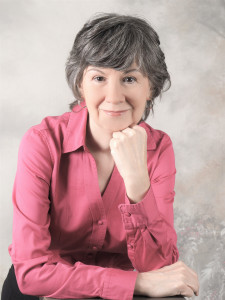 OLYMPUS DIGITAL CAMERA
OLYMPUS DIGITAL CAMERABesides the Cat Groomer Mysteries, Eileen Watkins, also has published equestrian and paranormal suspense novels. She has always shared her home with at least one cat and regularly visited the nearest riding stable. She belongs to Sisters in Crime and Mystery Writers of America. Visit her online at www.efwatkins.com and www.facebook.com/EileenWatkinsAuthor.
Readers: Cats and cozy mysteries, a natural combination? What are some of your favorite mystery series featuring cats?
February 4, 2021
A Time to Swill
Yesterday I sent off the copy edits for A Time to Swill. It’s the second Chloe Jackson Sea Glass Saloon mystery. Sending off the copy edits is always nerve-racking business for me. I want to smooth one more sentence. I want to read it one more time to see if I missed anything. I want ONE more day.
Copy edits are the last chance to make big changes and I did this time. The opening scene is an action scene. I realized that I’d slowed the action in several spots. It resulted in a complete rewrite of twelve pages of the manuscript.
I’d made some major changes in several sections before I turned it in last fall. I found a couple of errors in the copy edits because of that. Whew–at least I found them before it was too late. Now A Time to Swill is back at Kensington where it will get typeset–or whatever they call that process these days. Then I’ll get one last chance to go over the manuscript when the page proofs arrive, but at that point you can only make minor changes. (They send you a note with dire warnings about trying to make major changes at this point.)
Here’s the cover copy:
Saloon owner Chloe Jackson is after a murderer with skeletons in the closet–and one on a boat.
BAD TO THE BONE
Chloe loves her new life pouring beers and mixing cocktails at the Sea Glass Saloon in the Florida Panhandle town of Emerald Cove. But on the job, the only exercise she gets is walking from one end of the bar to the other, so in the mornings she loves to run on the beach. On this morning’s foggy run, she spots a sailboat washed up on a sandbar. Hearing a cry, she climbs aboard the beached vessel to investigate and finds not only a mewling kitten–but a human skeleton in the cabin.
The skeleton is tied back to Chloe’s friend Ralph, whose wife disappeared on a sailboat with three other people twelve years ago. Believing his wife was lost at sea, Ralph remarried. Now he finds himself a murder suspect. Chloe is determined to find out who’s been up to some skulduggery, but her sleuthing will lead her into some rough waters and some bone-chilling revelations…
A Time to Swill is up for preorder and releases on July 27, 2021. Signed copies will be available at One More Page Books in Arlington, Virginia.
Part of the story is based on a real life happening in Destin, Florida, but I’ll write more about that later. Readers: Do you like books when the author uses something factual but then twists it?
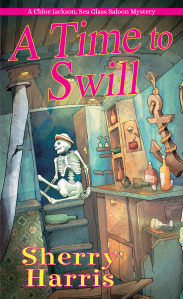
February 3, 2021
Wicked Wednesday: When you wish upon…
The theme for February Wicked Wednesdays is Wishing. I think we all make wishes when we blow out birthday candles (a tradition that may have gone the way of the dodo thanks to the pandemic). And we all know to wish upon a star. What other objects or situations does your family or friend group wish upon?
I’m giving away an Advance Reader Copy of Shucked Apart to one person who answers the same question below.

Edith/Maddie: Gosh, I’m not sure I have any others. No, wait. I think this came from my ex-husband’s family. When the car goes over a bump, if you are the first one to both touch the car ceiling and say, “Pudiddle,” you get to make a wish. Sorry, that’s all I got!
Jessie: I love this topic, Barb! I have lots of wishing traditions but one that I particularly like is to blow a wish into a a bottle once the contents are emptied. I always do it with seltzer bottles and wine bottles and especially bottles of champagne. I didn’t think anyone else did until I hosted a dinner party that included friends from Russia. They were surprised to see me do it and said it is something they did in their home country!
Liz: Barb, love this – and just like in the picture above, when I was a kid we had tons of dandelions that grew in my back yard. I used to think they were so pretty and bright even though everyone called them weeds. And when the flowers fell off and it dried up, if you blew the dried petals away, we used to make a wish.
Sherry: I’m not around many fountains these days, but we always used to wish when we threw a coin in a fountain. And there’s been a few times in my life when we’d wish on a wishbone.
Julie: I haven’t thought about this in a long time. We were dandelion blowers, and also buttercup believers (if someone held a buttercup under your chin and saw yellow you got your wish). Wishbone pullers. Coin tossers. I love the idea of wishing into an empty bottle. I still wish on a full moon.
Barb: I never heard of wishing on a full moon! Or Edith’s Pudiddle. We were wishing people too–wishbones carefully dried, dandelions, buttercups. We haven’t mentioned the one where if you lose an eyelash you put it on your finger and blow it away and get to make a wish.
Edith/Maddie: Chiming back in to say I wish I’d waited to contribute! Of course we wished on dandelions and coins and wishbones. I just couldn’t think of any of those on the spot. *forehead slap*
Readers: What about you? What wishing traditions does your family practice?
February 2, 2021
Author Clea Simon on the Case…and a #giveaway
News Flash: Debra Pruss is the lucky winner of Edith’s ebook.
Author Clea Simon is New England-based and a friend of the Wickeds (FOW). She visits us most years when she has a new release. Today she’s here in support of her latest book, A Cat on the Case, the third book in her Witch Cats of Cambridge series.
In her post, Clea reflects about writing her book in a pre-pandemic world, and then going through the publishing cycle and launch in our current reality. This is my situation as well so I read with great interest.
Clea is giving away a copy of A Cat on the Case to one lucky, U.S.-based commenter below.
Take it away, Clea!
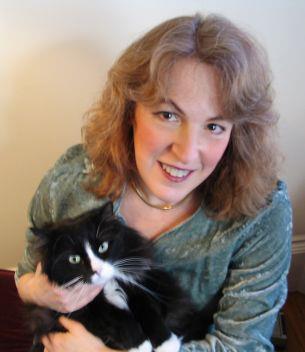 Clea Simon
Clea SimonWhen we read, especially cozies, we enter anothe, better world. Sometimes, I’m finding, that world is one that once existed – and maybe one day can again.
When the pandemic first began shutting everything down last March, I was nearly done drafting A Cat on the Case. That timing – and the fact that this is the third in my “witch cats of Cambridge” series – made what we writers call world-building easier. Authors just starting new projects as our society closed down had to struggle with whether to include this new reality in their fictional settings. I not only had most of a book already in place, I had it in an existing series universe, a place where people could interact without masks. Without fear of anything, really, except, you know, the odd murder, missing heirloom, or strange stalker glimpsed as a shadow on a dark street corner.
At first, writing a novel set in the “open” world seemed quite normal. With the exception of one wise friend who warned me, “we’re entering the Twilight Zone,” nobody I knew thought this whole COVID thing would last long. Certainly, I never imagined the pandemic would still be raging when my book came out. Then, as the lockdown lengthened and my manuscript moved into edits and revisions, I became grateful for its normalcy. “Becca ducks into the conservatory,” one of my notes read. “Visits realtor.” Even as my fingers itched to have her cover her face, to question whether an unannounced visit would be welcomed, I reminisced about such spontaneity. In-person interactions – indoors and without sanitizer… imagine that!
Now that vaccines are on the way, I’m finding this nostalgia bittersweet. Here in the Greater Boston area, the colleges – including the two music schools I based the book’s conservatory on – are already at least partially re-opened (though many classes are still online). But little shops like Charm and Cherish, where Becca works? Many of them have closed for good and will live on only in books like mine. In some cases, these were already gone, victims of gentrification or what locals call the “mall-ification” of places like my beloved Cambridge. Many, many more have gone out of business over the past ten months, victims of the pandemic-blighted economy. While these closures do not compare in any way to the loss of lives – more than 400,000 nationally – I mourn these places, too. These local independents were not simply commercial ventures. The bookstore where the clerk knew your tastes? The coffee shop that always saved you an iced lemon scone? They were our gathering places, the heart of our cities, and also the employers of so many of my friends and neighbors.
Maybe there’s a silver lining in all of this. Maybe, once we are free to socialize again, new ventures will spring up from the ashes. People who have lost jobs – or simply stayed too long in positions they once considered “safe” – will seize the moment, launching new shops, restaurants, music venues, and more. Now that we have rational leadership in Washington, I am hopeful that there will be economic assistance for such projects. There would certainly be a market. I firmly believe that after nearly a year of visiting so many of our favorite places only online – or in books, like mine, set here in my home city or in many of the other places worldwide that I love – the appetite for browsing in person, shopping, and sipping will surge forth. If that happens, maybe soon we can begin our real world-building, creating places to gather and read, to meet and laugh once again.
About the Book
A stranger comes in from the storm…
When a panicked stranger shows up at Charm and Cherish seeking advice – and maybe something more, Becca Colwin knows it’s her duty to help. The aspiring witch detective understands how challenging the city can be for a young woman alone, especially as the New England winter tightens its frigid grip. Plus, with her apartment building going condo, Becca needs all the clients she can get in case she has to find a new home for herself and her three cats.
But when that stranger disappears, leaving behind her heirloom violin, the case grows complicated – and the discovery of a dead body right next door puts Becca in danger from the law… and maybe a murderer as well. Although Becca’s cats don’t want her to get any more involved, they know their person won’t abandon the young musician who seems likely to be framed for the crime. The three littermates – bossy Harriet, manipulative Laurel, and gentle Clara, the calico baby of the litter – may squabble like all sisters, but each of the magical cats must use her particular skill if they’re going to keep Becca safe. Together the three felines must untangle a web of deceit and intrigue complicated by the history they share with the person they are sworn to protect.
The third “Witch Cats of Cambridge” cozy mystery continues the larger story of Harriet, Laurel, and Becca in a standalone adventure. “Fans of feline cozies will be charmed.” – Publishers Weekly
Buy LinksAmazon: https://www.amazon.com/dp/1951709268
Indiebound: https://www.indiebound.org/book/9781951709266
About CleaA former journalist, Clea Simon is the Boston Globe-bestselling author of nearly 30 mysteries. These alternate between cozies like her new A Cat on the Case, the third witch cat of Cambridge mystery, and darker psychological suspense, (Hold Me Down, coming Oct. 5). She can be reached at www.cleasimon.com
Reader question: How do you feel about reading about a pre, during, or post-pandemic world? Are you nostalgic for the past, or want to see your current reality reflected, or longing for a better, different future? One lucky U.S.-based commenter will win a copy of A Cat on the Case.
February 1, 2021
Guest-Alexis Morgan
Jessie: In New Hamshire, enjoying the lengthening of daylight.
Alexis Morgan is our guest again today and I as someone who is also also a plotter rather than a pantser I was delighted to read her post. I am sure you will find it fascinating too! She is offering ARCs as giveaways to tow commenters with US shipping addresses.
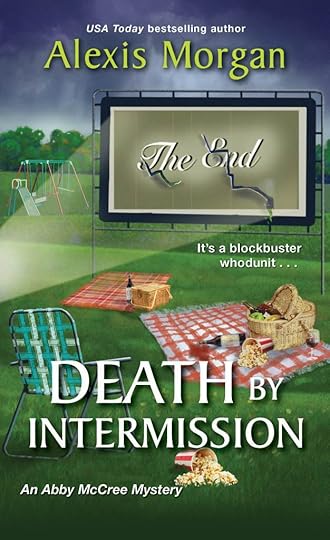
Abby McCree spends a summer showing family films under the stars—only to end the season with an unexpected slasher flick . . .
Ushered once again onto another committee by the mayor of Snowberry Creek, Washington, Abby is tasked with keeping the box office receipts of the town’s Movies in the Park nights. Cut to the director’s chair from where she’s suddenly organizing the summer’s last feature. From the opening scene through the final credits, Abby feels she’s earned nominations for best volunteer, best movie date with her tenant Tripp Blackston—and best daughter for ignoring her mother Phoebe’s own movie date with Owen Quinn.
Unfortunately, Abby and the others are treated to a post-credits scene: the body of local insurance agent Mitchell Anders. This discovery is followed by a plot twist revealing that the murder weapon comes from Owen’s food truck. With her mother’s boyfriend suspected of murder, Abby starts her own investigation determined to shine a spotlight on the real killer . . .
LAWN CHAIRS AND MURDER…
Did you know lawn chairs can be lethal?
Okay, that’s a bit of an exaggeration, but it’s true that a lawn chair did play a starring role in my newest release, DEATH BY INTERMISSION. You see, when I start at ground zero to begin plotting a story, I often start with a single image and the plot develops from there. That object needs to be something the reader won’t expect to be significant to the plot.
In my first Abby McCree Mystery, it was a missing quilt, one held special significance to Abby, my amateur sleuth. In the second book, it was a beautifully carved jack-o’-lantern. In the third book, it was a something hidden in a toilet tank.
But as I began plotting the fourth book, I immediately imagined a man sitting in a lawn chair, the bill of his baseball cap pulled down low over his face. I could see him so clearly. At that point, I started asking myself questions.
 This is the folding chair for outdoor
This is the folding chair for outdoorWhere was he? There were so many possibilities, but I settled on him being at the city park in Snowberry Creek, the town where Abby lives.
When was he there? That was a bit harder. In theory, it could be any time of day. I liked the idea of him sitting in the deepest shadows just inside the tree line at the top of a small rise long after dark.
But why was he there? Whatever the reason, it would also have to account for why Abby would be there, too. Well, Abby has an ongoing problem with being “volunteered” to take on various committees and events in town. It only made sense to me that this time she should be in charge of a movie-in-the-park night. The movie is over, and Abby is patrolling the area looking for trash and personal articles left behind by the other movie goers.
So far, so good. But why did the man in the chair not leave when everyone else did? Well, it is a murder mystery after all. Once again, Abby gets drawn into a murder investigation to answer the hardest question of them all: Whodunit?
I love plotting a book and the whole creative process behind it. As an avid reader myself, I often wonder what the author’s initial moment of inspiration was that led her to write a book that I particularly love. So here’s my question for everyone today:
If you could ask any author to explain how one of your favorite books came to be, who would it be and which book/series would you ask about?

BIO:
USA Today Best-selling author Alexis Morgan lives in the Pacific Northwest with her husband. She is the author of over forty novels, novellas, and short stories that span a wide variety of genres. DEATH BY INTERMISSION is the fourth book in her first cozy mystery series, The Abby McCree Mysteries.
WEBSITE: www.alexismorgan.com
COVER COPY:
. .
January 29, 2021
Edith’s Ebooks are Back! #giveaway
Edith here, on one of the coldest days this winter.
But my spirits are warm! Pour yourself a cup of tea or a glass of wine and I’ll tell you a story. (I’ll try to keep it short.)
Once upon a time, Midnight Ink, a division of Llewelyn Publishing, published crime fiction. Lots of it. All genres of it. Award-winning books of it. When Editor Terri Bischoff offered me a three-book contract back in 2014 for my historical Quaker Midwife Mysteries, I joyously signed.
Annually starting in 2016 Midnight Ink released the adventures of Quaker midwife Rose Carroll: Delivering the Truth, Called to Justice, and Turning the Tide. Each was nominated for an Agatha Award for Best Historical Novel. I signed a contract for three more books. Charity’s Burden released in spring, 2019.
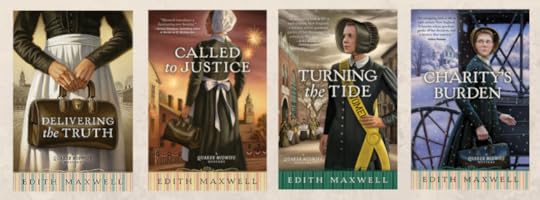
I wrote book five, Judge Thee Not (due on January 1, 2020), had it edited, and polished it.
Boom. In the fall of 2019, Llewelyn announced it was closing the entire line of Midnight Ink books. Many excellent authors were stunned. And orphaned, including Wicked Julie with her Theater Cop series, and me with Quaker Midwife books five and six.
I knew I wasn’t done with midwife Rose and her sleuthing tales, and I had book five ready to go. I signed a contract with Beyond the Page Publishing to put out books 5-7. Charity’s Burden was nominated for – and then won – the Agatha Award for Best Historical Novel (in a virtual presentation, it being last spring). For the time being, Midnight Ink kept selling and distributing books 1-4.
Until…boom. Again. In September, 2020, Llewelyn reverted the books 1-4 rights to me and precipitously removed the e-books from all markets. Ugh. Paper copies are out there for sale, but nobody had access to Kindle, Nook, or any other e-versions.
I didn’t get the rights back to the gorgeous original cover art by Greg Newbold, but I did have the very nearly final book files. Still, if I paid an artist to do new covers, would I ever make the money back? And did I want to do the work of converting the Word files into eformats? I had a busy fall, writing and, oh yeah, having hand surgery and coping with pandemic depression. I stayed in denial about the project.
But with A Changing Light coming out in April, the Quaker Midwife Mysteries aren’t over yet. And ebooks are permafresh. So this month I bit the proverbial bullet. I hired Dar Albert, the cover designer for books 5-7.
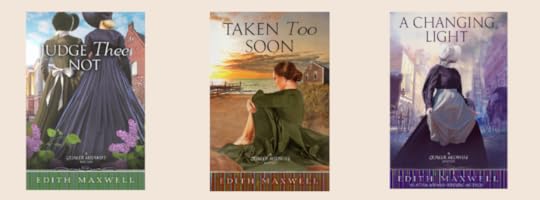
She already knows the era and the style of my covers, and does a beautiful job (plus, her web site is Wicked Smart Designs – we were a match made in, well, wicked heaven). I wrestled my way through the ebook conversions. And now? Voila!
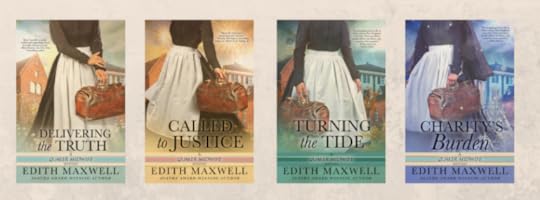
I have ebooks again! We kept the covers simple, variations on a theme. I love them. As of this writing, Changing the Light hasn’t yet been connected with the rest of the series, but we’re working on that. And the new ebooks are integrated with their other versions.
I’m delighted to cross this task off my long-term to-do list. To celebrate, I will happily send one commenter an ebook from the series – winner’s choice! (Although you’ll have to wait until April for A Changing Light.)
Readers: What have you knocked off your to-do list lately?
Guest Amy Pershing #giveaway
Edith/Maddie here, wrapping up the first month of the year from north of Boston.
News Flash: Mary Anna is the lucky winner of Murder on Cape Cod from Wednesday’s post! Mary Anna, please check your email, and congratulations.
My new friend Amy Pershing has a new mystery series set on Cape Cod. I figure her protagonist and mine should collaborate on solving a mystery one of these days, and I’m super happy to welcome her to the blog to talk about A Side of Murder.
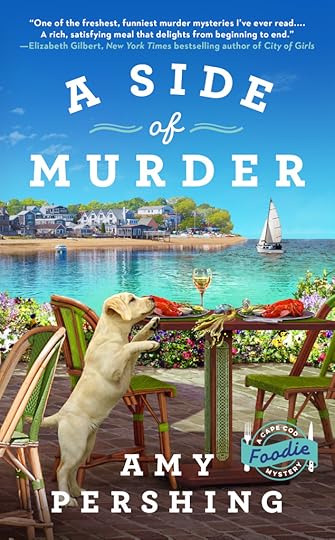
I can’t wait to curl up with my own copy and head into someone else’s fictional Cape Cod murder – and solution. Here’s the blurb:
Beautiful Cape Cod, Massachusetts, is known for seafood, sand, surf and now … murder. Samantha Barnes was always a foodie. And when the CIA (that’s the Culinary Institute of America) came calling, she happily traded in Cape Cod for the Big Apple. When Sam inherits a house on the Cape and lands a job writing restaurant reviews, it seems like the perfect pairing. What could go wrong?
The dilapidated house comes with an enormous puppy. Her new boss is, well, bossy. And the town’s harbor master is none other than her first love. Nonetheless, Sam’s looking forward to reviewing the Bayview Grill—and indeed the seafood chowder is divine. But the body in the pond outside the eatery was not on the menu. Sam is certain this is murder. But as she begins to stir the pot, is she creating a recipe for her own untimely demise?
“Cape Cod provides a stunning background for a debut that offers the ideal combination of mystery, romance, and recipes.” Kirkus Reviews
Cape Cod as Character
I’ve always been drawn to mysteries in which the setting is a character in itself. Think of Ann Cleeves’ Shetland Islands, Louise Penney’s Three Pines, Donna Leon’s Venice, or Alexander McCall Smith’s Botswana. This was what drew me to writing cozy mysteries, where the sense of place plays such an important role. In the Cape Cod Foodie mysteries, I wanted to make the Cape I knew and loved as real as any other character in the book.
In A SIDE OF MURDER, my heroine, disgraced chef Samantha Barnes, retreats home to the Cape from New York. Of course the Cape is lovely, and Sam is the first to acknowledge this when she talks about her “one true thing,” saying: “Crystal Bay is the most gloriously beautiful body of water in the world. On a crisp mid-May morning, dazzled by the sunlight sparkling on its deep blue waters, entranced by the new green mantling its small, uninhabited islands, taking great breaths of the fresh salt breeze, one could be forgiven for thinking that this was what the dawn of the world had looked like.”

Sam is conflicted about being back on the Cape. This has more to do with her feelings about the town’s Harbor Master – and her first love — Jason Captiva than the Cape itself. But, still, it spills out, as when Sam complains about Cape Cod’s changeable moods. “The common wisdom,” she points out, “is that Cape Cod is paradise. Rolling ocean breakers on long stretches of golden sand. Tidal pools and spectacular sunsets. Lobster rolls, ice cream stands, silver-shingled B&Bs… all paradise.” But, she adds, “What Cape Codders know is that the Cape has only two seasons — tourist season and mud season. And autumn, of course, which is lovely, but even that only lasts for a month or two. But from November until well into June is mud season. Cold and grey and wet and unending.”
But Sam also knows that she’s not being entirely honest, that there are many joys in a Cape Cod winter. Just look at her friend Jenny, who, she says “adores winter walks along the long empty curve of Shawme beach, particularly when a blow is coming and the ocean is grey and angry. When nor’easters throw rain against the windows of her house and the wind moans and whips the tops of the locust trees, Jenny happily retreats inside, where she sets bread dough to rise, drinks tea and plays Monopoly (at which she cheats, I might add) with the Three Things. On the rare sunny day, she takes the boys to Trout’s Point to look for ospreys diving for fish or for a seal playing with a banner of kelp.”

Of course, in the end, Sam realizes that no matter what the weather, Cape Cod is, in fact, her heaven on earth. “It was another chilly, grey, gusty day,” she says. “We had the beach to ourselves except for the sandpipers scuttling along the wet sand at the water’s edge and the gulls wheeling and crying overhead. It was beautiful. It was paradise.”
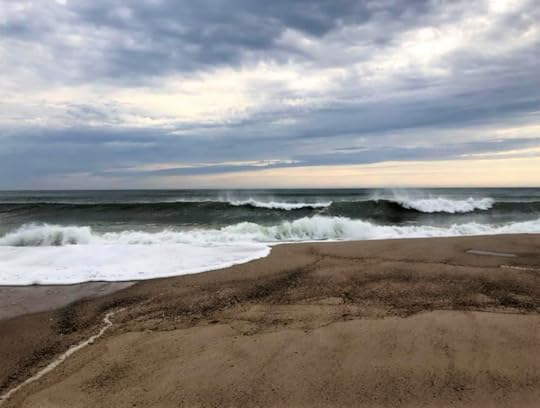
(All photos courtesy of Molly Avellar at AdornCapeCod.com)
Readers: What about you? Do you have a favorite mystery or series in which the setting plays a huge role? One lucky commenters wins a copy of A Side of Murder (North America only).

Amy Pershing is a lifelong mystery lover and wordsmith. She was an editor, a restaurant reviewer and a journalist before leading employee communications at a global bank. A few years ago (with the final college tuition bill paid), she waved goodbye to Wall Street to write full time (and spend more time sailing on the Cape). A Side of Murder, the first of the Cape Cod Foodie mysteries, is her debut novel. You can learn more on Amy’s website and follow her on Facebook and Instagram.



